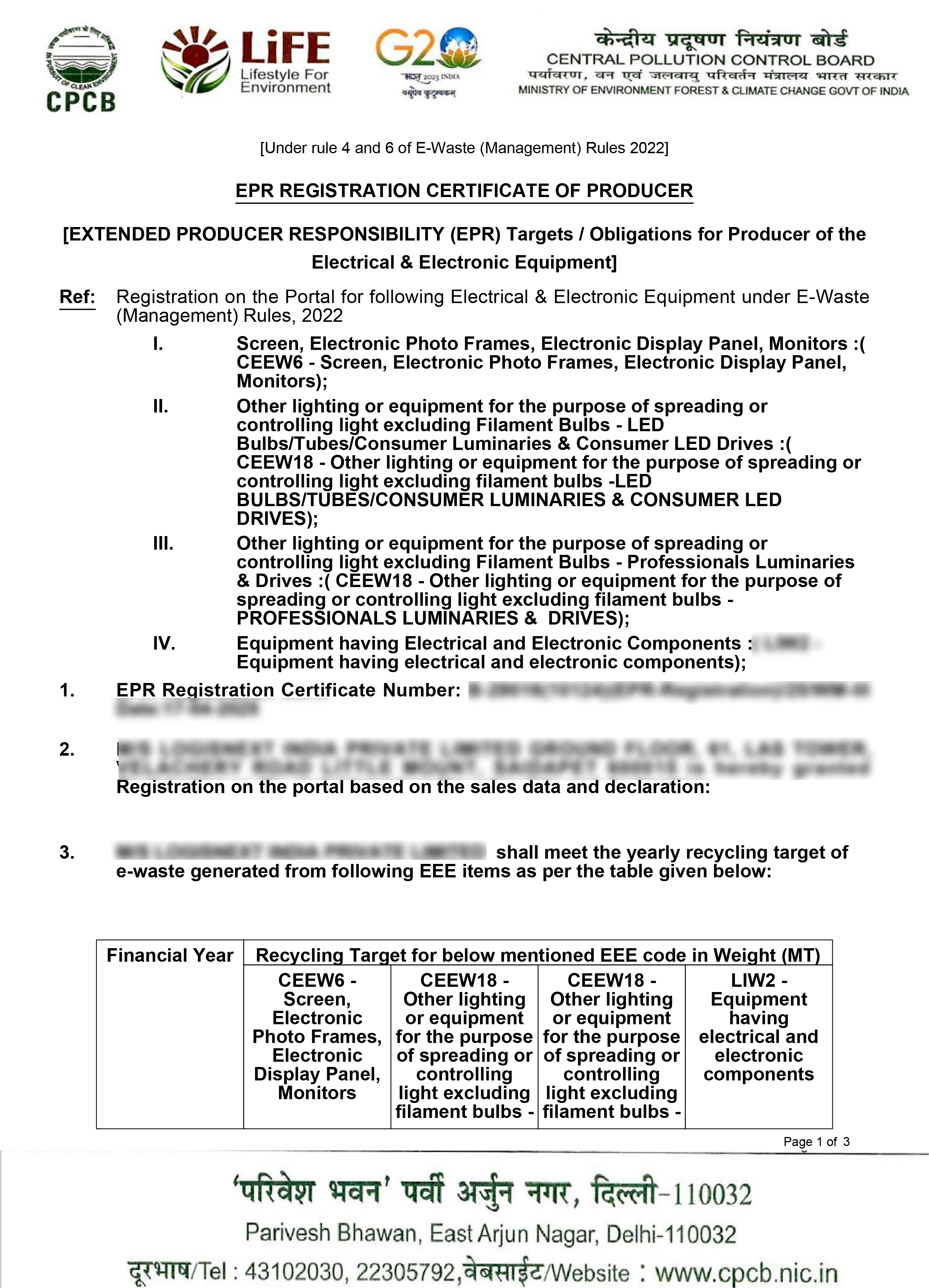
Get Instant Solution By an Expert Advisor
(4.8)
EPR: Extended Producer Responsibility Certification for E-Waste refers to the registration of producers, importers, and brand owners of electronic waste issued by the Central Pollution Control Board, CPCB. We at Agile Regulatory, with a team of experienced professionals, will offer you end-to-end support and deliver the certificate within the given timeframe.


10000 +
Projects Completed for Our Respected Clients.
15 +
Years Experienced Advisors in Indian Compliance.
98.9%
Project Delivery Ratio for Our Valuable Clients.
99.9%
Satisfied Customers All Over India.
Being a country witnessing rapid development and industrialization, India has constantly been one of the worst performers in terms of environmental safety index in the world, generating more than two million metric tons of waste every year. Furthermore, rapid advancements in commercial sectors like information technology and communication encourage the production and use of electronic goods. Furthermore, as electronic devices are updated quickly and frequently, users are forced to replace their outdated equipment with newer models, which produces more trash. It is vital to immediately put a stop to the growing waste stream. Without a doubt, recycling is the first option that comes to mind.
This compelled the Indian government to establish regulations and enforce tougher mechanisms for certain individuals and corporate entities operating, managing, or handling environmental pollution through the Extended Producers Responsibility, EPR authorization. Read further to learn about EPR authorization for e-waste, its benefits, the process to gain EPR authorization, and post-compliance for EPR authorization.

EPR stands for Extended Producers Responsibility and is a government policy that extends the responsibility for the treatment of electronic wastes and their disposal in an environmentally sound manner by producers, importers, manufacturers, and brand owners. The key objective of EPR guidelines is to ensure that manufacturers and producers take responsibility for minimizing the impact of the waste generated by their products.
Producers must collect waste from their products' life cycle through the take-back process or eco-friendly recycling, ensuring registered recyclers handle the process with the Pollution Control Committee or Board. The Central Pollution Control Board or CPCB under the Government of India gives authorization for EPR. Under Plastic Waste Management Rules 2016, guidelines have been issued by the CPCB for collection, storage, transportation, segregation, recycling, and disposal in an ecologically safe and secure manner.
On November 2, 2022, the Ministry of Environment, Forests, and Climate Change released the E-Waste Management Rules 2022. It became operative on April 1, 2023.
This rule requires all producers, manufacturers, recyclers, and refurbishers to register on the EPR portal for the collection of e-waste produced during the production, refurbishing, or disposal of any electrical or electronic equipment and make sure that the waste is recycled or disposed of. Under the relevant category, such as manufacturer, producer, refurbisher, or recycler, the entities must register on the EPR online portal. An entity must register under each category independently if it fits into more than one. Any firm that conducts business without registering is breaking the law.
This rule also mandates that all entities are required to file annual and quarterly returns in the prescribed format on the site by the end of the month following the quarter or year to which the return relates.
The CPCB requires EPR registration for producers, manufacturers, bulk users, importers, recyclers, dismantlers, and collection centres to comply with E-Waste (Management) Rules in India, which have been explained in detail below:
Producers: Anyone who produces and supplies electrical and electronic devices, in tandem with their components, materials, parts, and spares, which include hazardous substances, qualifies as a producer for these regulations, irrespective of how they sell their products through an agent, merchant, internet shopping platform, etc.. It also covers any person who undertakes to market any foreign electronic and electrical equipment, in addition to its components, consumables, parts, or spares, under his own brand.
Importers: These regulations apply to anyone importing potentially dangerous material-containing electronics and electrical devices, along with the elements, supplies, replacement parts, and consumables that go with them.
Brand Owner: These regulations extend to any brand owners who deal in hazardous substance-containing electronics and electrical devices, including the elements, supplies, replacement components, and consumables accompanying them.
The advantages of having an EPR certificate go beyond being merely legally compliant. Let's quickly go over the advantages of EPR compliance:
Promotes sustainable use of resources: An organized EPR strategy helps companies deconstruct obsolete items for reuse or recycling, enhance their lives, and make sustainable use of resources.
Encourage environmentally responsible growth: EPR, as an extended producer responsibility, seeks to minimize pollution, optimize the conservation of natural resources, and limit the production of hazardous electronic waste.
Constructive Environmental Impact: Are you familiar with the methods used for trash disposal? Either electronic garbage is disassembled or it is burned. Sadly, nothing can be done through these methods to lessen the effects of trash on the environment. In addition, the informal sector in India treats 97% of the waste. Consequently, the EPR authorization reduces reliance on conventional and unfriendly waste disposal techniques.
Lowering Expenses and Improving Productivity: Businesses can reduce operating expenses and generate long-term savings by following the EPR registration requirements and other pertinent regulations. Furthermore, companies could reduce their manufacturing costs and boost productivity by implementing responsible product designs and low-cost packaging.
Promotes business branding: In the present era, when consumers favour ecologically and socially responsible enterprises, having an EPR registration indicates a company's consistent dedication to safeguarding the environment and social corporate practices. As a result of EPR registration, businesses can improve their reputation and customer confidence, increasing client retention and market competitiveness.

Filling out the application: Producers, importers, manufacturers, and brand owners need to create login credentials for the CPCB e-waste portal and fill out the form under the EPR e-waste management portal.
Submission of the application: An applicant has to submit all necessary documents related to company registration and the product as well.
Payment of Application Fee: An applicant fee must be paid online through the CPCB EPR e-waste portal. applicant can choose multiple payment sources like RTGS, IMPS, NEFT, UPI, etc.
Verification of the Application: Following receipt of an application, the competent authority, CPCB, may entirely review the application and undertake an inquiry for clarification.
Receipt of the Authorization Letter: The authority will issue a letter of authorization for the management of e-waste if it determines that the application is true and full in every way. An EPR authorization for the management of e-waste is valid once it is granted for five years.
EPR authorisation financially incentivizes manufacturers to build for recycling and produce goods that last longer. Extended producer responsibility also acts as a strategy for preventing planned depreciation. Businesses that have acquired EPR authorization might greatly benefit from cost savings, improved productivity, and, above all, assistance in creating a safe and secure environment. If you wish to acquire an EPR authorization for e-waste management, refer to Agile Regulatory for acquisition and any guidance required related to the same.

Get Instant Solution By an Expert Advisor
(4.8)
Yes. The answer is that both the EPR certification and the certificate for e-waste management are the same.
The management recommendations for technical waste made by the Central Pollution Control Board must be followed. After exhibiting your ability to follow the same, you may be granted an E-Waste Management or EPR Licence.
Refer to point no.6 above.
In pursuance of the Plastic Waste Management Rules 2016,the MSME enterprises shall be excluded from EPR authorization for e-waste management.
If you are an electronic producer, EPR Registration is more important than anything else. It implies that in addition to offering the items, you are also concerned about the environment. This caring factor might benefit you in an environment in which individuals are searching for a person who can relate to the world's difficulties.
When an EPR application is successfully certified by the Authority, a registration code called an EPR number is assigned to them. It is stated on the EPR authorization certificate.
Proven 4-step Process: Consultation, Documentation, Submission, and Certification.
Startups to large enterprises, we deliver end-to-end solutions business compliance needs.

What our customer says about us
Fantastic support from the team. Their expertise transformed our approach, driving remarkable outcomes. A must-have partner for businesses seeking effective consulting solutions. Highly recommended.

Lavkush Sharma
KTPL Instruments
Agile Regualtory delivers exceptional solutions. Their insightful guidance streamlined our processes and boosted profitability. Highly recommended for businesses seeking expert consulting services to thrive.

Nitin Mukesh
Justrack IOT
Impressed by Agile Regulatory's expertise. Their strategic insights and practical solutions have elevated our business operations. A reliable partner for effective consulting services. Highly recommended for growth-focused businesses.

Pradeep Varma
Coaire Compressor
Extraordinary consulting services. Their insightful solutions and dedicated team reshaped our business, driving remarkable improvements. Highly recommend it for transformative results.

Bharat Bachwani
Easy Polymer
Incredible experience with Agile Regulatory. Their innovative strategies and expert advice revitalized our business model, resulting in impressive growth. Highly recommend their exceptional consulting services.

Atul Jain
Tarus International
Top-tier consulting! offered strategic solutions that revolutionized our approach. Their deep expertise and personalized guidance made a significant impact on our success. Highly recommend their services.

Paramjeet Singh
Anchor Weighing
Agile Regulatory exceeded expectations! Their tailored solutions, expertise, and proactive approach led to remarkable results. Highly recommend for businesses seeking impactful and strategic guidance.

Anshul Rathi
AM Capacitor
Outstanding service! delivered targeted solutions with professionalism and expertise. Their insights elevated our business strategies, resulting in noticeable growth. Highly recommended for exceptional consultation.

Shekhar Maurya
Imaxx Pro Aquistic